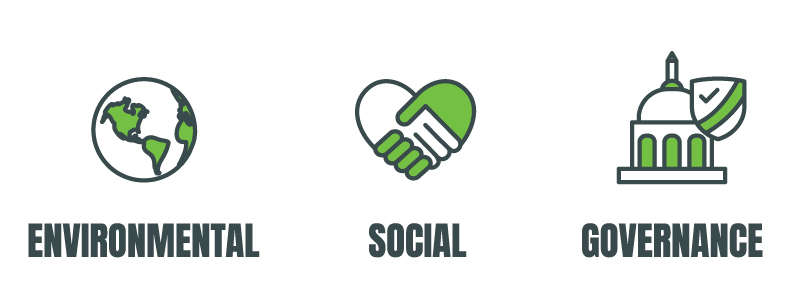Sustainability has long been a corporate buzzword that has seen a significant renaissance on the global business landscape. You’ll recall the days where “going green” meant shifting to a paperless office or adopting recycling. Today, these types of policies often encompass broader concepts but are also more nuanced, leading potential clients to explore how your business is not only a good steward in your local market, but how it impacts the global economy—and small businesses aren’t immune.
ESG EXPLAINED

Environmental: The “E” in ESG refers to environmental factors, which include how a business interacts with the natural environment. It considers things like energy and resource efficiency, waste management, pollution reduction, and climate change mitigation. Essentially, it’s about how a business takes care of the planet.
Social: The “S” in ESG stands for social issues and focuses on how a business interacts with people and communities. It considers aspects such as employee well-being and diversity, customer satisfaction, community engagement, human rights, and labor practices. The goal is about treating people fairly and being a responsible member of society.
Governance: The “G” represents governance and examines how a business is managed and governed. It includes areas such as transparency, ethics, accountability, board diversity, and shareholder rights. Good governance ensures that a business is run in a responsible and ethical manner.
As we’re sure you’ve figured out, we’re talking about ESG, or Environmental, Social, and Governance. It refers to a set of factors that businesses consider beyond financial performance when evaluating their overall impact to society and the planet. It’s important to note that ESG is not about imposing strict regulations or incurring significant costs. Instead, it’s about adopting practices that align with sustainability and responsible business behavior. Small business owners can focus on making gradual improvements within their means, such as reducing waste, promoting employee well-being, engaging with the community, or implementing transparent policies.

Environmental: The “E” in ESG refers to environmental factors, which include how a business interacts with the natural environment. It considers things like energy and resource efficiency, waste management, pollution reduction, and climate change mitigation. Essentially, it’s about how a business takes care of the planet.
Social: The “S” in ESG stands for social issues and focuses on how a business interacts with people and communities. It considers aspects such as employee well-being and diversity, customer satisfaction, community engagement, human rights, and labor practices. The goal is about treating people fairly and being a responsible member of society.
Governance: The “G” represents governance and examines how a business is managed and governed. It includes areas such as transparency, ethics, accountability, board diversity, and shareholder rights. Good governance ensures that a business is run in a responsible and ethical manner.
These efforts are being driven by how various countries around the world are tackling issues like climate change, human rights, and best labor practices. In the US, the Biden administration has made environmental policies a cornerstone, notably by heavily investing in emerging technologies (including a major push toward building out the infrastructure for platforms like electric vehicles). Regarding social issues, DEI—Diversity, Equity, and Inclusion—was also a major focus of Biden’s first 100 days in office, and continues to be. The European Union has been even more aggressive by requiring businesses to meet certain climate and labor rights benchmarks, which is having a ripple effect throughout the world, including publicly traded companies in the US.
Last month, the Global Business Travel Association (GBTA) held its most recent Sustainability Summit in Washington, D.C. At the conference, and in conjunction with their charitable arm, the GBTA Foundation, they shared their findings on how corporate travel buyers and suppliers are pledging their commitment to sustainability. Unsurprisingly, their respondents resoundingly affirmed—100 percent in Europe and Asia as well as 86 percent in North America—that they are adopting sustainable business travel policies and working with companies that are equally committed.
That being said, the largest international corporations do have a bigger obligation to be global leaders on this front, which ultimately trickles down to their partners and suppliers (aka YOU). You may have experienced some of these requests from your corporate clients already, and if not, it’s probably coming. Investors have also become increasingly sensitive to these types of initiatives, and they tend to look to businesses that are striving for these benchmarks when considering financing. So, if you’re interested in how you can improve your business’ ESG presence without breaking the bank, or at least how you can be more attractive to your corporate and retail clients, read on—and you might be surprised to learn that you’re doing some of these practices already.
-
Efficient Route Planning
Efficient route planning not only saves time and money but also minimizes fuel consumption and emissions. Most companies are already taking advantage of software that utilizes advanced technology and tracks real-time traffic data to optimize routes, so you might be ahead of the game. This approach demonstrates your commitment to reducing environmental impact while maximizing operational efficiency. - Track and Report Progress
Your software may also help you track and measure your sustainability efforts by monitoring data on fuel consumption, mileage, and emissions. Use this information to identify areas for improvement and set realistic goals. Transparently report your progress to clients, showcasing your commitment to continuous improvement and accountability. Knowing your cost per mile will help with your financial goals as well. - Vehicle Maintenance and Upkeep
Our fleet is our lifeblood, so this is another area where your company can shine just by doing what you’re doing or adding a few tweaks. Implementing a rigorous maintenance schedule and adopting eco-friendly practices during vehicle upkeep can optimize fuel efficiency and minimize emissions. To step it up a notch, opt for eco-friendly cleaning products and techniques to maintain the interior and exterior of your fleet. Share these practices with your corporate clients, highlighting your attention to detail and dedication to reducing environmental impact. - Collaboration With Sustainable Partners
The “E” often commands a lot of attention, but all three complement each other. One way to tackle your social engagement is by forging partnerships with other businesses that share your sustainability goals, which is especially beneficial if you’re new to the concept of ESG and need some guidance. Collaborate with hotels, event venues, and travel agencies that prioritize these practices, and share your own ideas. Together, you can offer comprehensive sustainable transportation solutions to corporate clients, creating a seamless and sustainable experience throughout their entire hospitality journey. - Community Involvement
Building on the previous point, engage with local environmental initiatives or charities to showcase your commitment to the community and beyond. Operators in our industry are especially generous partners in their market, so why not participate in local clean-up events, sponsor tree-planting activities, or support educational programs on environmental conservation. These actions demonstrate your dedication to ESG principles, even on a tight budget. - Transparent Reporting and Certifications
To build trust and credibility, provide transparent reporting on your ESG initiatives and performance. Share annual reports highlighting key metrics such as carbon emissions, fuel efficiency improvements, and energy consumption reductions if you collect these data. Consider obtaining certifications from recognized sustainability organizations or industry-specific programs. Certifications like LEED, ISO 14001, or Green Globe can demonstrate your commitment to sustainable practices and provide an added layer of assurance to your corporate clients. - Employee Engagement and Training
Engage your employees in your efforts by promoting awareness and providing training on environmentally friendly practices. Encourage them to adopt energy-saving habits, promote eco-conscious driving techniques, and participate in local environmental initiatives. Well-trained and engaged staff will not only enhance your efforts but also project your commitment to ESG values to your corporate clients. - Get Electrified
One of the most impactful steps a chauffeured transportation business can take is transitioning to an electric vehicle (EV) fleet. By replacing traditional internal combustion engines (ICE) with electric cars, you can significantly reduce carbon emissions and showcase your dedication to combatting climate change. All of the major manufacturers currently offer (or will in the near future) EVs that could work for your operation. However, this may not be a solution for every company as it requires a significant financial outlay as well as a shift in your operations to allow for charging time, staff training, and extra layers of redundancies when planning longer trips. It also overlooks the tremendous gains in fuel efficiency that the major automotive manufacturers have made over the past decades, and while it can always improve, focusing on EVs may put innovation for ICE on the backburner. Many operators are concerned about EV’s limited range, cost, access to charging, practicality, or governmental regulations for adoption. Like all new technology, it requires a cost-benefit analysis to see if it’s right for your service.


